

BBC World Service. Nominal sentence. The relation of nominal sentences to verbal sentences is a question of tense marking.
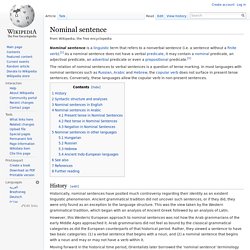
In most languages with nominal sentences such as Russian, Arabic and Hebrew, the copular verb does not surface in present tense sentences. Conversely, these languages allow the copular verb in non-present sentences. History[edit] Historically, nominal sentences have posited much controversy regarding their identity as an existent linguistic phenomenon.
Ancient grammatical tradition did not uncover such sentences, or if they did, they were only found as an exception to the language structure. However, this Western/ European approach to nominal sentences was not how the Arab grammarians of the early Middle Ages approached it. Syntactic structure and analyses[edit] Figure 1. To successfully account for the syntactic structure of a nominal sentence, there must either be a change in the phrase structure rules or a zero copula must be assumed. Figure 2. What Are Prepositional Phrases in Grammar? Like adjectives and adverbs, prepositional phrases add meaning to the nouns and verbs in our sentences.
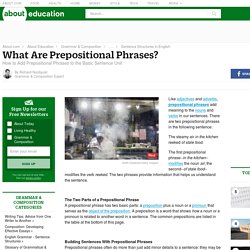
There are two prepositional phrases in the following sentence: The steamy air in the kitchen reeked of stale food. The first prepositional phrase--in the kitchen--modifies the noun air; the second--of stale food--modifies the verb reeked. Grammar and Punctuation: Using Coordinating Conjunctions. Use coordinating conjunctions to indicate that the elements they join are equal in importance and in structure.
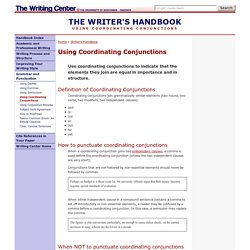
Definition of Coordinating Conjunctions Coordinating conjunctions join grammatically similar elements (two nouns, two verbs, two modifiers, two independent clauses): and or nor so but for yet How to punctuate coordinating conjunctions Conjunctions that are not followed by non-essential elements should never be followed by commas. Perhaps no budget is without some fat, but university officials argue that their unique function requires special standards of evaluation. When either independent clause in a compound sentence contains a comma to set off introductory or non-essential elements, a reader may be confused by a comma before a coordinating conjunction.
The figures at elite universities, particularly, are enough to cause sticker shock; yet the current increases at many schools are the lowest in a decade. When NOT to punctuate coordinating conjunctions. Dependent clause. The different types of dependent clauses include noun clauses, relative (adjectival) clauses, and adverbial clauses.
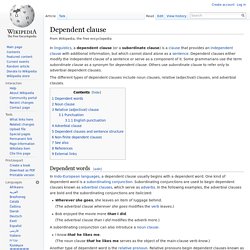
Dependent words[edit] In Indo-European languages, a dependent clause usually begins with a dependent word. One kind of dependent word is a subordinating conjunction. Subordinating conjunctions are used to begin dependent clauses known as adverbial clauses, which serve as adverbs. Conditional sentence. A full conditional sentence (one which expresses the condition as well as its consequences) therefore contains two clauses: the dependent clause expressing the condition, called the protasis; and the main clause expressing the consequence, called the apodosis.[1] An example of such a sentence (in English) is the following: If it rains, the picnic will be cancelled.
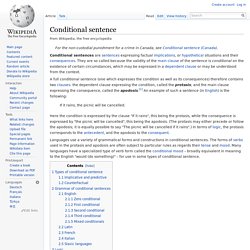
Languages use a variety of grammatical forms and constructions in conditional sentences. The forms of verbs used in the protasis and apodosis are often subject to particular rules as regards their tense and mood. Many languages have a specialized type of verb form called the conditional mood – broadly equivalent in meaning to the English "would (do something)" – for use in some types of conditional sentence. Types of conditional sentence[edit] There are various ways of classifying conditional sentences. Implicative and predictive[edit] If you heat water to 100 degrees, it boils.
Dependent clause. English relative clauses. Overview[edit] The basic relative pronouns are who, which and that; but see alternative analysis of that below.The relative pronoun comes at the very start of the relative clause unless it is preceded by a fronted preposition: "The bed on which I was lying".
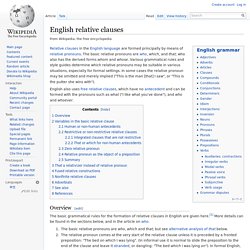
(In informal use it is normal to slide the preposition to the end of the clause and leave it stranded, or dangling: "The bed which I was lying on"). In formal English, and rarely, the relative clause may start with a larger phrase containing the relative pronoun after a preposition: "The bed, the owner of which we had seen previously, .. Relative pronouns (who, which, that, whose, whom & what) - English grammar tutorial video lesson.